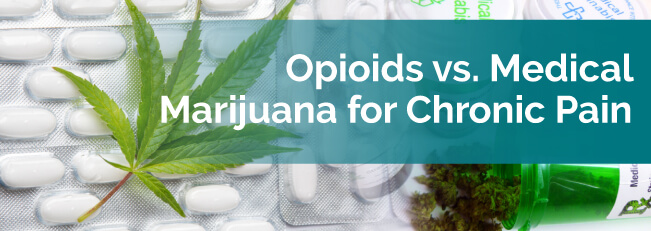
For most people, taking acetaminophen or ibuprofen is enough to fix common aches and pains. However, if you suffer from chronic pain, over-the-counter meds just won’t cut it. Pain becomes a daily acquaintance and makes even the simplest activities challenging, impairing a patient’s day-to-day life. There are many causes of chronic pain, from illnesses to injuries. Sufferers of this condition will try almost anything to alleviate the discomfort.
If your pain is severe and chronic, lasting more than 12 weeks, your doctor will most likely prescribe you a pain medication, maybe even a prescription opioid. Though these medications can provide adequate relief, they’re often accompanied by a whole slew of adverse side effects. The number one danger is their addictive nature, causing many patients to get hooked on painkillers.
Doctors are now considering the potential of medical marijuana for chronic pain. For years it’s been criticized as a recreational drug for “potheads.” Now, we’re discovering its medicinal benefits. One of these is its analgesic, or pain-relieving, properties. Cannabis can relieve chronic pain and is a much safer alternative to traditional pain medications.
When chronic pain becomes insufferable, many patients turn to powerful drugs called opioids. These are medications with morphine-like effects. They provide a “mellow high” that relieves most patients feelings of pain. Opioids are illegal unless prescribed by a doctor, and it’s also illegal to seek opioid prescriptions from multiple physicians.
Many opioids are derived from the opium poppy, a historically abused narcotic. There are also synthetic and semi-synthetic opioids that mimic the chemical properties of the drug.
Opioids are considered toxic, so it’s not surprising that using them can cause adverse reactions. The side effects associated with these drugs can be as difficult to manage as the chronic pain they’re intended to relieve. Some of the most common side effects associated with them include:
The most horrifying statistic of prescription opioids is the fact that it has led to the death of tens of thousands of people in the U.S. alone.
Many states allow patients to seek medical marijuana treatments for chronic pain. With the addiction to prescription opioids on the rise, medical marijuana is considered a far safer treatment option. Cannabis allows patients to find relief from pain as well as live a better quality of life.
Medical marijuana is all-natural and doesn’t have the adverse side effects associated with opioids. Although it’s criticized for getting users “high,” many strains of cannabis relieve pain without the drug haze that opioids cause. THC and CBD and two compounds in marijuana with natural analgesic properties. Unlike opioids, they’re non-toxic. Cannabis works with our bodies pain receptors to relieve uncomfortable sensations.
There are many advantages to using medical marijuana for chronic pain versus opioids. Besides its relative safety, other benefits include:
If you feel medical marijuana would be a better treatment option for your chronic pain, make an appointment with a marijuana doctor. They can recommend you to your state’s medical marijuana program, monitor your use and recommend dosage amounts, ensuring you use medications safely and effectively.